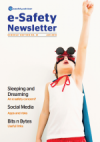 In my latest e-safety newsletter I look at whether technology could be a factor of sleep deprivation in children. Here’s the excerpt from the newsletter and you can subscribe and download for free HERE.
In my latest e-safety newsletter I look at whether technology could be a factor of sleep deprivation in children. Here’s the excerpt from the newsletter and you can subscribe and download for free HERE.
Quite often (and quite correctly) we’ll concentrate on the very safeguarding concerns of e-safety. If you’re at a school or you work with children that’s a statutory responsibility, but it’s important that we don’t forget other important but quite diverse areas.
The over-use of digital devices.
Is there such a thing? I’m not sure yet, but the evidence is leading me to think yes. Much like children and violent/sexually explicit games I think we’re only just beginning to understand these areas, however for that very reason I think we need to be more risk aware and err on the side of caution..
A couple of weeks ago I read a very interesting article online (link at the end) which was written by Dr. Richard Graham who is a Consultant Child and Adolescent Psychiatrist. In it he speaks about the potential for the greatest impact on health and well-being which is sleep disruption. He writes that this is one of the main symptoms reported by young people who are seeking help to control their use of technology such as games,
tablets, laptops etc.
Should this be a concern for schools?
Those who know me know that I love technolgy. Despite some shortfalls and frustrations I truly believe that technology is a force for good, particularly when used appropriately for education. But I am becoming concerned with device over-use. Despite the advice and guidance I give to others, I still lie in my bed last thing at night (sorry to put that vision in your head) catching up on the latest innovations, risks, initiatives etc. and every single time it takes me ages to get off to sleep, my mind is racing, yet I have to do this, it’s the only way I can keep up. I’ll wake up tired, irritable, grumpy, unable to concentrate. I’m sure this resonates with many readers of this newsletter. I know the effects this has on me, but what about children and young people?
In his article, Dr. Graham ponders whether it is the distraction of using devices (social networks, games etc.) or a chemical effect that their use has on our brain? I’m inclined to think it may be both; for many children and young people, their friends and interests are online and that’s where they want to be. At the extreme end of this you have what is commonly termed the ‘fear of missing out’ or FOMO, in other words what or who are their friends talking about? Clearly there has to be a chemical effect too, and this is where Dr. Graham cites research carried out at Harvard University in which they compared the sleep of persons who read an ordinary paper book to those who read from an e-reader. Those who read from the e-reader led to a 55% reduction of the sleep hormone melatonin. The individuals struggled to get to sleep and then struggled with wakefulness and alertness the following day. There was also a reduction in REM sleep. Many of the schools I visit mention that they are seeing this effect on children, sometimes this crosses over into the children that are playing highly inappropriate games until the early hours.. There are behavioural issues such as a decline in good behaviour, refusal to eat, lack of concentration. Of course this can’t be wholly attributed to using technology, but it does need to be a consideration.
Over the last couple of years there has been a huge increase in the use of technology across many areas of the curriculum, it’s no longer just an ICT lesson, and it does make me wonder if we need to be thinking carefully about the amount of screen time that children are getting in school, as well as homework that requires the use of a screen.
This is a really important issue and I would recommend you raise it with your parents. If you subscribe to my parents newsletter I’ll be discussing this same topic to make them aware in a couple of weeks.
I haven’t done Dr. Graham’s article any justice here so take a look for yourself, it’s a fascinating read.
To view the full article in the Huffington Post click HERE


